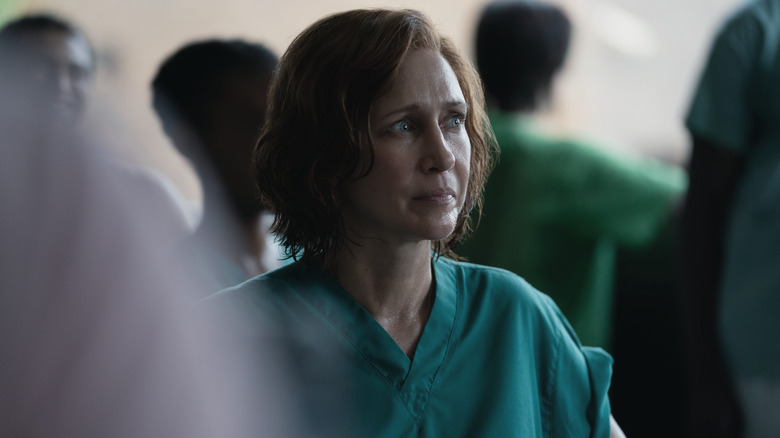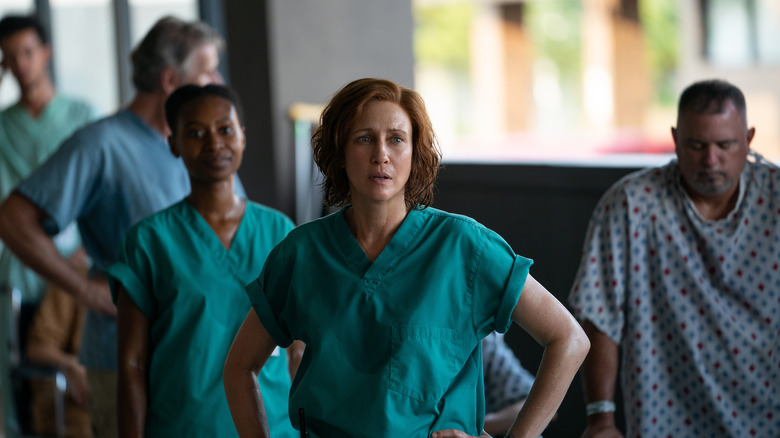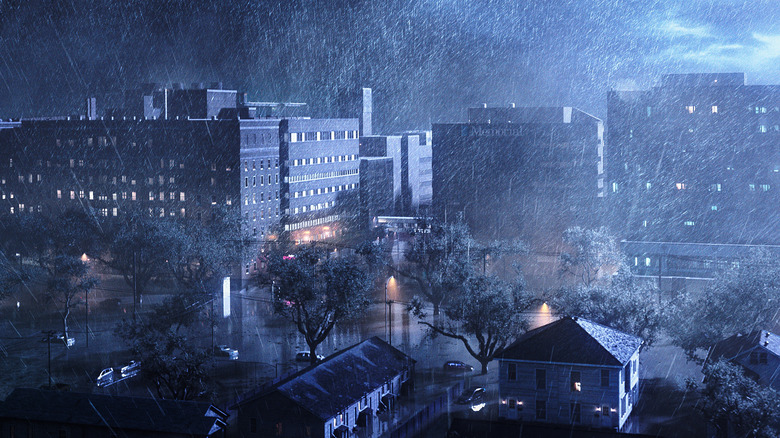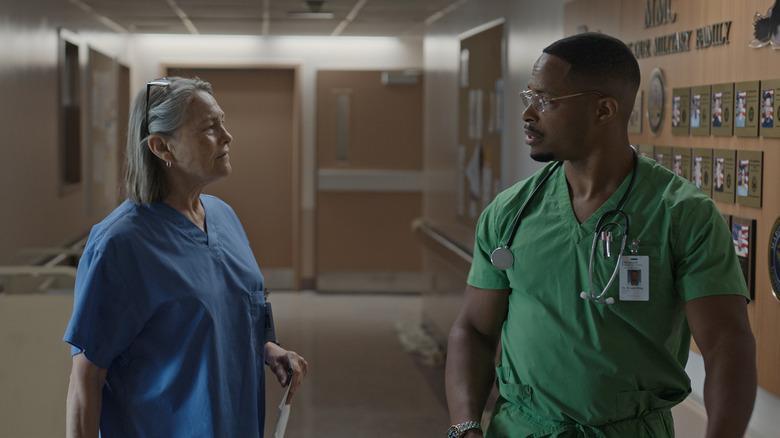Five Days At Memorial Review: A Harrowing, Disturbing Mystery With No Good Answers
In August of 2005, Hurricane Katrina swept into New Orleans, Louisiana. The media had played the hurricane up as a once-in-a-lifetime event; something that was sure to cause death and destruction. But eventually, the storm subsided. And while it caused damage and flooding, things didn't seem nearly as bad as some residents had thought. At least at first. But it all grew increasingly worse due to a severe lack of assistance. The levees broke. The water rose ... and so did the body count. At Memorial Medical Center, doctors and patients were effectively trapped. Five days later, 45 patients in the hospital were dead.
Patients die at hospitals all the time, but this was an unusually high number for such a short period of days. So what happened? Those of us who weren't there can never fully know the stress, anxiety, and horror those trapped in the waterlogged hospital experienced. But the question lingers: what happened to those dead patients? In the days and weeks following the event, rumors began to spread — talk of euthanasia for patients deemed unable to save via helicopter evacuation.
Sheri Fink covered the story in a Pulitzer Prize-winning article "Five Days At Memorial" that was then expanded into a book, and now the events have become a harrowing, highly disturbing miniseries on Apple TV+. The series takes us across those five mysterious days within the hospital and beyond, and while it leaves several questions up in the air, it also becomes abundantly clear that the individuals trapped in that hospital — both patients and staff — were failed by unprepared leaders and crumbling infrastructure.
Horrific lengths
"Five Days at Memorial" jumps back and forth in time, first giving us interviews with several staff members post-Katrina. Who is interviewing them, and why, is kept something of a mystery at first, for no good reason other than to seemingly draw the story out a bit and provide some intrigue. From there, we're dropped into the hospital the night before the storm fully hits. We're introduced to several staff members, including the religious Dr. Anna Pou (Vera Farmiga), who is relatively new to the hospital and looked down upon by several of her coworkers. There's also Susan Mulderick (Cherry Jones), a nursing director who also operates as the hospital's incident commander. It's her job to have the hospital prepared, but it becomes apparent rather quickly that she hasn't considered every contingency. Worse: when she flips through a large binder with instructions for emergencies, she discovers there's no plan in place for evacuating the hospital during a flood.
As it so happened, Memorial actually housed two different hospitals — there was the main hospital, which was originally called Baptist. But upstairs, on the top floor, resided LifeCare, which provided long-term care for severely ill patients. While these two medical centers were located in the same building, their staff were completely separate and had almost no contact with each other. Sure enough, when things start to get progressively worse, a disconnect begins to form between the two hospitals.
The series' first episode does a solid job establishing a rotating cast of characters as well as the various spaces of the hospital, and as the series unfolds, actual news footage from Katrina is cut in to give us a wider scope of what's going on. The series ramps up the tension as the storm gets worse, but the first episode will perhaps be the calmest of the bunch, because what follows grows progressively dire and so disturbing that it had me squirming, wildly uncomfortable with what I was watching. This is not a complaint — this is a disturbing story, after all, made all the more unsettling by the fact that it's based on reality. But "Five Days at Memorial" eventually goes to such horrific lengths that it begs the question: will anyone want to watch this? Or will it be too gruesome to endure?
An investigation
In an attempt to keep "Five Days at Memorial" from becoming full-blown misery porn, writers John Ridley and Carlton Cuse switch things up after digging into the five days. We meet Arthur "Butch" Schafer, an assistant attorney general in Louisiana's Medicare Fraud Control, played by Michael Gaston with calm grace. He's one of the people conducting the interviews that frame the series. These interviews begin to turn up the specter of euthanasia, and Butch is hesitant to believe it at first — doctors killing their patients seems too outlandish for him. But the more he digs, the more perturbed he becomes. A man suffering from the recent loss of his daughter, Butch is a grieving, melancholy character who serves as a kind of guiding light; someone removed from the action of the hospital trying to figure out just what the heck went on.
Farmiga's Dr. Pou is the person who keeps coming up, again and again, in the interviews. Numerous people, including Dr. Bryant King (a fierce and confident Cornelius Smith Jr.), one of the few Black doctors at the hospital, have their suspicions that Pou had something to do with the patient deaths. And a wealth of circumstantial evidence that strongly suggests Pou was involved. And yet ... there are also lingering doubts. Pou herself vehemently denies the charges, and it's to Farmiga's credit that she finds a way to never let us entirely into her character's headspace. We think we have a read on her, but what do we really know? At one moment, we sympathize with her. At another, we're suspicious. It all depends on the perspective of who saw what, and when. And again: how can any of us know how we'd react under the same harrowing circumstances?
A horror story
Lopsided storytelling harms "Five Days at Memorial" — I found myself wishing the show had started off with Butch and his investigation and worked its way back from there, rather than getting to him late in the game. But one thing the show does exceedingly well: it gives us a feel for how awful things were inside that hospital. While we outsiders can never know exactly how it felt, the hopelessness and horror radiate from scene to scene. All of it is underscored by how horrible everyone looks. With the power knocked out due to the storm, there's no air conditioning in the hospital. And anyone who has ever visited New Orleans can tell you that place is hot. And not just hot, but horribly humid — I visited New Orleans for a weekend a few years ago and I don't think there was a single second where I wasn't sweating, and I had the benefit of using air conditioning. Now imagine being trapped in a building with no A/C under such temperatures while still trying to deal with sick and dying patients.
While the characters look fresh-faced and suitably hydrated when we first meet them, as things grow worse at Memorial, everyone's physical appearance unravels along with their mental state. All the actors are drenched with sweat, their hair plastered to their foreheads, their hospital scrubs hanging limp and soggy about their bodies. You feel uncomfortable (and moist) just watching it all.
"Five Days at Memorial" is frightening, frustrating, and worth checking out, if only to get some appreciation for what happened in the aftermath of Katrina. There are heroes in this story — brave members of the hospital staff who truly cared for the well-being of their patients, and these acts of courage and resolve work to counteract the overwhelming bleakness. But the bleakness can't be completely tamped down. No matter how you think things played out, one thing is clear: what happened at Memorial is a horror story.
"Five Days at Memorial" arrives on Apple TV+ on August 12, 2022.



